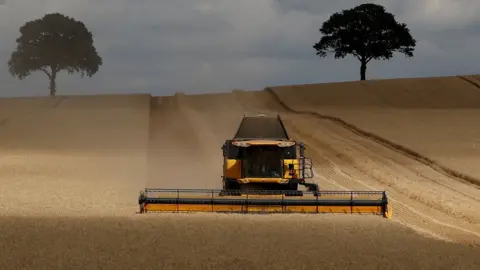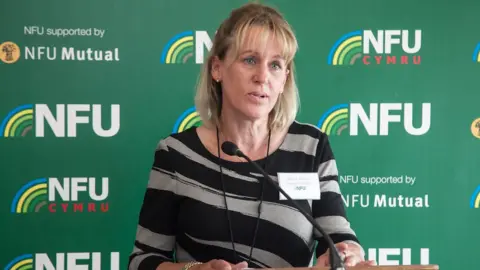Government review of ELMS farming subsidies stokes anger
 Reuters
ReutersA major overhaul of farm subsidies that rewards landowners in England for their environmental work is in doubt after the government signalled a review.
Environmental groups and some farmers worry the government could water down the overhaul, known as environmental land management schemes (ELMS), but the NFU farm union had requested a delay.
ELMS is designed to replace the EU's common agricultural policy (CAP).
A government spokesperson confirmed it was "rapidly reviewing" its plans.
ELMS was the biggest shake-up of farm policy in England for 40 years, introduced after Brexit to replace the EU's CAP payouts.
Those grants were worth about £3.5bn annually and the majority were paid based on how much land each individual farmer owned, leading to criticisms that the payments benefited the wealthiest.
The new ELMS subsidy framework was cast into doubt after a number of landowners and farmers had meetings about the scheme with the Department for Environment, Food and Rural Affairs cancelled.
News of the review prompted an unusually outspoken statement from the director-general of the National Trust, Hilary McGrady.
"Rather than ramp up action to support our environment, this government appears however to be heading in the opposite direction," she said.
Cambridgeshire farmer Martin Lines, who is chairman of the Nature Friendly Farming Network, which promotes sustainable farming, said that any delay to the ELMS scheme would deny farmers crucial support to adapt to a changing climate.
"If the government is stalling ELMS, it is failing any duty of leadership in maintaining momentum and building resilience," he said
ELMS is made up of three payment schemes - the sustainable farming incentive, local nature recovery and landscape recovery.
Under the system, farmers could be paid subsidies based on a range of environmental work, from improving water and soil health and creating wildlife habitats to rewilding whole landscapes.
But those with smaller farms had voiced concerns that the new nature-friendly system would not offer them enough to stay in business.
NFU president Minette Batters said her organisation had wanted a delay to the schemes' introduction.
"We called for a delay not because we wanted to hang on to the status quo but because we believe that the SFI needed to have more detail and it needs to be profitable," she said.
"We have always been calling for a better policy, one that does deliver for food production and for the environment."
 Digital-Photo.co.uk/Gammon
Digital-Photo.co.uk/GammonShe also argued that the larger-scale rewilding projects should be paid for with private money, not public funds.
"We have got literally billions and billions of pounds in green finance that is looking to invest in wild environments. We should be making the private sector work effectively," she said.
A report earlier this year by think tank the Green Alliance estimated that delaying ELMS by two years would reduce the savings in agricultural emissions delivered by 2035 by half.
News of the review triggered warnings from environmental groups.
Craig Bennett, chief executive of The Wildlife Trusts, said "If we revert to an agricultural system where people get given taxpayers' money on the basis of how much land they own then one of the few potential benefits of Brexit will have been squandered. It will be unfair and unsustainable."
Richard Benwell, chief executive of Wildlife and Countryside Link, a coalition of rural conservation charities, said: "Farmers should be paid more and paid well for ambitious action to deliver environmental recovery, alongside producing healthy food."
He said any suggestion farmers be paid based on the amount of land they owned "would squander years of work and waste the opportunity to create a thriving agriculture sector that works in harmony with nature. Area-based payments are inefficient and inequitable".
A Defra spokeswoman said that, while environmental land management remained important, the department was reviewing its plans "given the pressures on farmers, and the government's aims of boosting food security and economic growth".
She added: "In the light of the current global economic situation, we know that the cost of inputs has gone up, which might make it more difficult for farmers to both improve the natural environment and underpin food production, so we will continue our engagement with the sector to make sure the outcomes that the British people want to see are delivered."
Agricultural policy in the UK is a devolved responsibility and each nation is implementing its own subsidy schemes.
